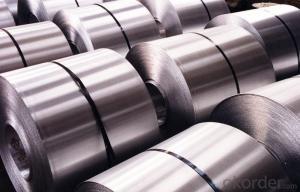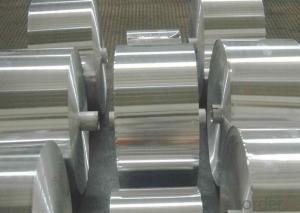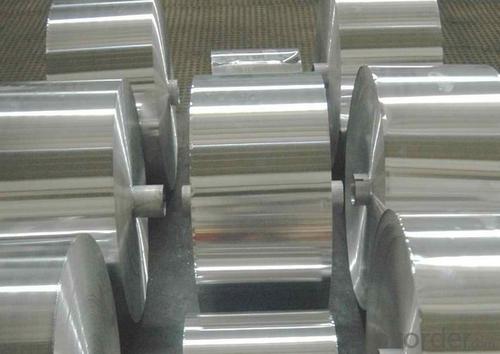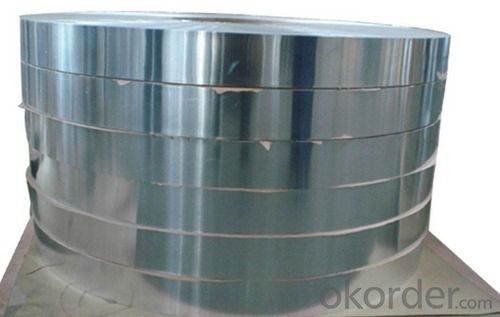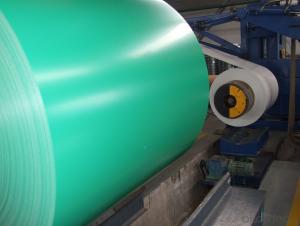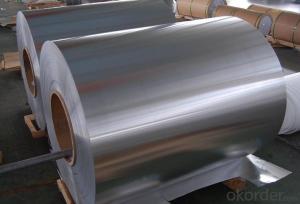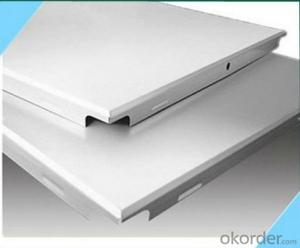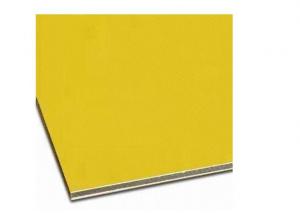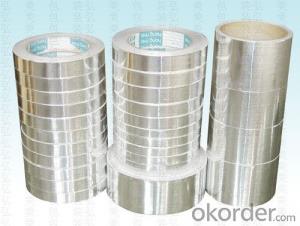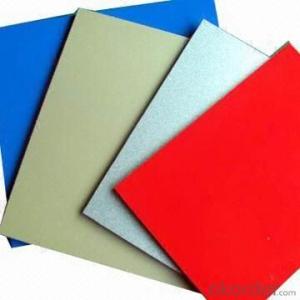Anodized Aluminum Coil for ACP (Aluminum Composite Panel)
- Loading Port:
- Shanghai
- Payment Terms:
- TT OR LC
- Min Order Qty:
- 1 m.t.
- Supply Capability:
- 2000 m.t./month
OKorder Service Pledge
OKorder Financial Service
You Might Also Like
Specification
Product Description:
The heat treatable alloys of 2000, 6000 and 7000 are such that when subjected to thermal temperatures, they again pronounced strengthening. Hence, tempers are indicated by "T". These alloys are also inventoried in clad form to increase corrosion resistance. All of the aluminum alloys are available in the annealed condition or commonly referred to as "O".
Aerospace - 2024, 6013, 6061, 7075
Construction - 3003, 5052, 6061
Electrical and Chemical Applications - 1100
General Machining Applications - 3003, 5052
Thickness from 0.18mm to more than 200mm are available for your needs. Aluminum can process to your special requirements and support traceability with complete Mill Test Certificate(MTC) and the essential industry specifications. More details about Aluminum sheet coil for Beverage Cans, Food Cans & Closures as following
Aluminum coil for aluminum composite panel
Always present in the development of aluminum coil for the Beverage Cans Making Industry, LingFeng offers Aluminum Coils for Beverage Can Body Stock, Coated End Stock and Bare or Coated Tab Stock. Lingfeng rolling facilities include: Modern equipment that guarantees high efficiency in the can makers lines and possible light-weight. A state-of-the-art lacquering line suitable for the coating of easy open end and tabe. PVC-free, BADGE-free and Solvent-free (free-based) lacquering systems are applied.
Being able to produce according to detailed customer requirements, Lingfeng can provide tailor-made solutions.
Aluminum sheet coil for Food Cans
New lacquerng line is suitable for the coating of bodies, lids and tabs of rectangular or round Food Cans for aggressive food or fruit-juice products. BADGE-free and Solvent-free (water-based) lacquering systems are applied. The material can also be supplied degreased, chromium phosphated and DOS treated.
Aluminum sheet coil for Closures
Committed to continuous development and full customer satisfaction, Lingfeng offers Pre-treated and Pre-coated Coils or Straight-cut Sheets for the production of Pilfer-proof Caps. Lingfeng provides high quality non-earing material, suitable for both one and two step Drawn Caps. Rolling experience and new lacquering facilities ensure excellent service in terms of products range and J. I. T deliveries providing Closures in three different aluminum alloys and two alternative finishes, bare or coated. Lingfeng material is used for the production of Pilfer Caps for carbonated and non-carbonated beverages, alcoholic or non-alcoholic drinks and as closures for pharmaceutical products.
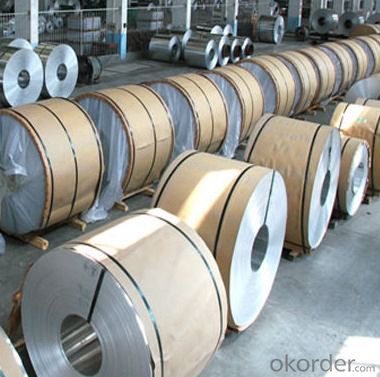
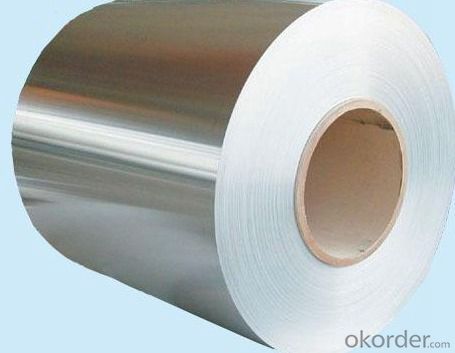
Aluminium Coil PPGL Specification:
Quality Certification
According to EN and GB/T standards or as per agreed customer specifications.
Aluminum Coil for Beverage Cans, Food Cans and Closures Specifications
| Production Range (mm) | |||||
| Aluminum Sheets/Coils for Food Cans | Aluminum Sheets/Coils for Food Cans | ||||
| Thickness | Width | Thickness | Width | Length | |
| Body | 0.250 min. | 2300 max. | 0.18-0.25 | 500-1020 | 1045 max. |
| End | 0.222 min. | 2300 max. | 0.20-0.30 | 100-1020 | 1045 max. |
| Tab | 0.235 min. | 45 min. | 45 min | 29 min. | Coils only |
| Production Range (mm) | ||||
| Beverage Cans- Dimension | Food Cans-Coil Dimensions | |||
| Inside Diameter | Outside Diameter | Inside Diameter | Outside Diameter | |
| Body | 400 or 500 | 1850 max. | 400 or 500 | 1800 max. |
| End | 400 or 500 | 1850 max. | 300 or 400 or 500 | 1800 max. |
| Tab | 400 | 1850 max. | 300 or 500 | 1800 max. |
| Closures-Dimension Range | |
| Thickness | 0.20-0.3 |
| Width | 500-1020 |
| Length(Sheet) | 1045 max. |
| Inside Diameter | 300 or 400 or 500 on carton core |
| Outside Diameter | 1800 max |
| Finishes-Treatment | |||
| Beverage | Food | Closures | |
| Body: | Pre-lubricated: According to customer requirement. | Degreased, Chromium phosphate converted and DOS treated. | Pre-treated: Degreased, Chromium phosphate converted and if requested DOS treated. |
| End: | Pre-coated & Pre-maxed: According to customer requirements. | Pre-treated: Degreased, Chromium phosphate converted and DOS treated. Coated: Pre-waxed and lacquered on public or product side of the can, or both. | Coated: Lacquered on either or both sides. |
| Tab: | Coated: Clear or coloured expoxy, or bare: degreased and DOS re-oiled | Coated: Clear or coloured coated or bare: degreased and DOS re-oiled | |
FAQ of Aluminium Coil for ACP (Aluminum Composite Panel):
1.Superior quality of raw material.
2.Reasonable and stable chemical composition.
3.Accurate tolerance.
4.Goode mechanical property.
5.We have the certificate of ISO9001.
- Q: How are aluminum coils used in the production of electrical conductors?
- Due to their excellent electrical conductivity and lightweight properties, aluminum coils find wide application in the production of electrical conductors. Typically manufactured from high-grade aluminum alloy, these coils ensure optimal electrical performance. To achieve the desired shape and dimensions of the electrical conductor, the production process involves initially forming the aluminum coils into thin, flat strips. These strips then undergo further processing using techniques like rolling, annealing, and drawing. After processing and forming, a thin layer of insulating material, such as enamel or varnish, is applied to the aluminum coil. This coating serves to prevent electrical leakage, ensure proper insulation, and protect against corrosion and environmental factors. The high conductivity and efficient electrical current-carrying capacity of aluminum coils make them commonly used in the production of electrical conductors like wires and cables. They are particularly favored in industries where weight is a crucial consideration, such as aerospace and automotive. Moreover, aluminum coils offer cost advantages over alternative materials, making them a popular choice for electrical conductor production. Their lightweight nature also facilitates easier installation and handling, reducing labor costs and time. In conclusion, aluminum coils are essential in the production of electrical conductors, providing excellent electrical conductivity, lightweight properties, and cost advantages. Their versatility and efficiency make them the preferred choice in various industries where electrical conductivity is of utmost importance.
- Q: How long do aluminum coils typically last?
- The typical lifespan of aluminum coils is approximately 15 to 20 years, but their longevity is heavily influenced by various factors including the quality of the aluminum, the installation process, and the maintenance and care given to them. The lifespan of the coils can be significantly prolonged by regularly maintaining them, such as by cleaning the coils and ensuring adequate airflow. Moreover, their durability can also be affected by environmental factors like exposure to severe weather conditions and corrosive substances. Hence, ensuring proper care and maintenance is crucial to guarantee the extended lifespan of aluminum coils.
- Q: Explain the distinctions among various welding equipment used specifically for joining aluminum coils.
- <p>Different types of welding equipment for aluminum coils include Gas Tungsten Arc Welding (GTAW), Gas Metal Arc Welding (GMAW), and Resistance Welding (RW). GTAW, also known as TIG welding, uses a non-consumable tungsten electrode and produces high-quality welds with minimal distortion. GMAW, or MIG welding, uses a continuous wire feed as the electrode and is faster but may not be as precise. Resistance Welding involves using electrical current to heat the metals at the joint, which is quick and efficient but not suitable for all aluminum alloys. Each method has its advantages and is chosen based on factors like weld quality, speed, and the specific aluminum alloy being welded.</p>
- Q: How to calculate the wall thickness with the gross weight of aluminum coil known?
- Gross weight*density=volume volume÷(aluminum sheet *width)=thickness
- Q: Are aluminum coils suitable for electrical conductivity?
- Indeed, aluminum coils prove to be suitable for electrical conductivity. With its conductivity rating at approximately 62% of the International Annealed Copper Standard (IACS), aluminum stands as a highly conductive material. Consequently, aluminum coils emerge as an exceptional choice for a variety of electrical applications, encompassing power transmission and distribution, electrical motors, and transformers. Furthermore, aluminum coils present a range of advantages, including their lightweight nature, high resistance to corrosion, and lower cost in comparison to copper coils. Nevertheless, it is crucial to acknowledge that aluminum exhibits a lower conductivity than copper, thus potentially necessitating larger aluminum coils to attain the same level of conductivity as smaller copper coils. In summary, aluminum coils remain a viable and frequently employed option for electrical conductivity.
- Q: This question asks for a comparison between steel wires and other materials when used in coilings, highlighting the pros and cons of steel wires.
- <p>The advantages of using steel wires for coilings include high tensile strength, durability, and resistance to corrosion. Steel wires are also cost-effective and widely available. They offer excellent fatigue resistance, making them suitable for applications requiring repeated coiling and uncoiling. Disadvantages include higher weight compared to some alternatives, which can be a concern in certain applications. Steel wires can also be prone to rust if not properly treated, and they may not be as flexible as some other materials, potentially leading to difficulties in handling or installation. Additionally, steel's magnetic properties can be a disadvantage in environments where non-magnetic materials are required.</p>
- Q: Is it possible to utilize aluminum coils for crafting artistic installations or distinctive creations?
- <p>Yes, aluminum coils can be used to create art installations and other unique creations. Their malleability, durability, and lightweight nature make them ideal for sculptural works. Artists can bend, shape, and weld aluminum coils into various forms, offering a wide range of design possibilities. The material's reflective surface can also add visual interest, especially when used in installations that interact with light and shadow. Additionally, aluminum's resistance to corrosion makes it suitable for outdoor art pieces, ensuring longevity and low maintenance.</p>
- Q: How are aluminum coils joined together?
- Aluminum coils are typically joined together through a process called welding. This involves heating the ends of the coils and applying pressure to fuse them together, creating a strong and seamless joint.
- Q: does anyone know any ANTI-PERSPIRANTS that don't have any harmful chemicals such as aluminum chloride? I need something that makes you not sweat but I don't want bad chemicals in it!
- I have thoroughly researched this, as I have been wanting the same thing and was going to post this exact question myself. After A LOT of research, I have learned that aluminum and all aluminum based chemicals in antiperspirants are what keeps us from sweating. Therefore, they all have it, it is just a matter of what percentage. I found a posting by Dt. Stephen Z. Fadem, MD, FACP. He is a member of the AAKP Medical Advisory Board. He claims the the FDA came to a conclusion that aluminum is safe when used according to the directions. I have my doubts on this. The American Cancer Association found inconclusive evidence that the aluminum in antiperspirants is related to breast cancer. I am frustrated by this as well as I need antiperspirants too. However, I learned that if you switch to just a deodorant, your armpits still sweat, (as this is a natural way for your body to get rid of toxins, but gross), but not as much. I have also learned that if you don't allow your body to get rid of the toxins in this manner, some toxins are stored in a gland near your breasts and this one of the ways that many people believe you get breast cancer. There are several other places that your body sweats out toxins as well, including behind your knees. Sorry I couldn't be more help, but unfortunately, there is no such thing.
- Q: Are aluminum coils suitable for beverage can manufacturing?
- Yes, aluminum coils are suitable for beverage can manufacturing.
Send your message to us
Anodized Aluminum Coil for ACP (Aluminum Composite Panel)
- Loading Port:
- Shanghai
- Payment Terms:
- TT OR LC
- Min Order Qty:
- 1 m.t.
- Supply Capability:
- 2000 m.t./month
OKorder Service Pledge
OKorder Financial Service
Similar products
Hot products
Hot Searches
Related keywords
